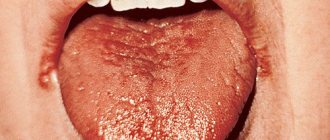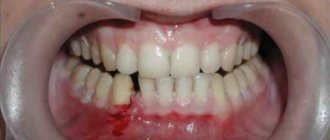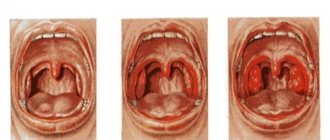Even if a person does not overdo it with spicy seasonings, it happens that the tongue burns (burns). We will describe the causes of this symptom, treatment and prevention of this condition. Most often, this sign indicates serious pathologies of internal organs and systems. But sometimes this is just an unpleasant discomfort that can be easily eliminated with improvised means.
In any case, it is important to first establish a diagnosis, the very cause of the burning sensation and other unpleasant phenomena. And only by knowing what exactly provoked such a reaction can one take adequate and effective methods.
Dental causes of burning sensation in the mouth
When the first symptoms appear, you should contact your dentist, because most often the reasons are related to his profile:
Oral candidiasis
Burning in the mouth and tongue after prosthetics or filling in most cases indicates poor quality of the procedure. The dentist could damage the mucous membrane during the operation or incorrectly manufacture the prosthesis itself. Some patients are allergic to the filling composition.- With candidiasis, the tip of the tongue stings the most, there is a feeling that the palate is burned, and there is a bitter taste. Sometimes there is pain in the throat area. The disease manifests itself due to the active proliferation of yeast fungus against a background of weakened immunity.
StomatitisThe cause of the disease can be glossitis. With this disease, due to the action of viruses and bacteria, the entire mucous membrane of the tongue experiences a strong burning sensation.
- Aphthous stomatitis is another disease that causes a burning sensation in the mouth. With it, small ulcers form on the mucous membrane, which hurt when touched. There is an unpleasant sensation in the mouth, like a burn from hot drinks.
What kind of plaque can appear on the tongue during gastritis and how to remove it?
Everything in our body is interconnected, so the sudden appearance of a rash or a change in the appearance of the tongue is always a signal of trouble in the body. Therefore, you should not ignore these symptoms.
How your tongue looks with gastritis can help in the initial diagnosis of the disease. Plaque, the appearance of spots - all this can inform the doctor about the presence of pathologies of internal organs.
What does a healthy tongue look like?
To check your health, carefully examine your tongue in the morning, immediately after waking up. If you are healthy, then this organ should look like this:
- the surface is covered with smooth, noticeable, but not protruding taste buds;
- pink color, not too saturated;
- plaque may be present in small quantities, and it should be translucent, slightly darker than the base tone of the tongue;
- humidity is moderate, dryness is a sign of pathology, but too much salivation is not the norm;
- no unpleasant odor.
Advice! Normal oral health can be considered a sign of good health, provided there are no other symptoms - pain, poor health, etc.
But an unusual condition of the tongue is a reason to consult a doctor, since this can be a sign of both functional disorders and serious diseases. If the appearance changes and plaque appears, accompanied by pain in the upper abdomen, nausea and heartburn, gastritis can be suspected.
Therefore, the patient needs to contact a gastroenterologist. Of course, the specialist will not limit himself to an external examination; he will definitely prescribe studies that will make it possible to make an accurate diagnosis.
Types of plaque on the tongue with gastritis
One of the early symptoms of problems with the digestive system is the appearance of unusual plaque. However, the tongue can be coated not only with gastritis, but also with a number of other health problems, so you should not draw conclusions about the state of your health on your own.
What disease can cause a burning sensation in the mouth?
If there is fever and general malaise, as well as other additional symptoms, the source should be sought in more serious diseases:
- The cause of a burning sensation in the mouth and throat is sometimes hidden in disorders of the gastrointestinal tract (GIT). Most often, people suffering from colitis or pancreatitis have to deal with this symptom.
- The patient may only feel that his mouth is baking and bitter. This is how the body reacts to serious stress; in such a state, the human body can behave unpredictably.
A feeling of dryness and burning in the mouth is one of the most common signs of both types of diabetes.
- Hormonal imbalance, especially at the very beginning of menopause, can cause burning in the gums. In this case, bitterness is sometimes felt on the tongue.
- Sjögren's syndrome does not appear so often, but still it should not be written off. The disease is called dry syndrome, since for no apparent reason it causes a disruption in the secretion of external glands, which ultimately leads to xerostomia - lack of saliva.
- Sometimes an acute deficiency of nutrients, primarily folic acid and vitamin B12, leads to the symptom. Usually in such cases it is the palate in the mouth that burns.
Infections
Respiratory diseases in the form of acute respiratory infections, acute respiratory viral infections, and influenza lead to pain and burning in the throat. This is due to the settling and proliferation of bacterial or viral cells on the mucous membrane.
Characteristic symptoms are:
Diagnosis by language
- sore throat;
- morning hoarseness, disappears after clearing the throat;
- cough due to irritation of the nasopharyngeal ring;
- pain when swallowing;
- catarrhal phenomena with further discharge of mucus from the nose;
- hyperthermia;
- malaise, weakness, chills.
Pharyngitis is accompanied by pain and burning in the throat area; it is difficult to swallow, especially solid food due to the pain. Inflammation of the pharynx is accompanied by a cough, increased body temperature, and headaches.
The voice and burning sensation in the throat have disappeared, what could it be? Such changes are associated with inflammation of the larynx and the deposition of pathogenic agents on the vocal cords. Laryngitis is accompanied by dry mouth, sore throat, dry cough and signs of intoxication.
The development of a sore throat causes a feeling of discomfort in the throat, followed by pain and burning of the tonsils and nearby tissues.
During the height of tonsillitis, patients refuse to eat due to severe pain. The condition quickly worsens with increasing intoxication and hyperthermia.
External reasons why it may bake in the mouth
Sometimes unpleasant sensations on the palate and tongue appear due to the occurrence of a serious illness, and it happens that the mucous membrane stings due to the influence of external factors that are easy to eliminate:
- Most often, the cause of baking in the mouth is mechanical damage to the mucous membrane. People can injure their tongue and lips while eating; less often, poor-quality dental care leads to damage to the oral mucosa.
- If the palate and tongue are burned by hot food or drinks, the discomfort will continue for at least a few more days. Sometimes the burning sensation continues after the tissue has healed.
- You may develop an allergic reaction to oral care products. For many, this symptom is caused by the presence of sodium lauryl sulfate in toothpaste. It dries out the mucous membrane, which gradually provokes itching and a feeling that the person’s whole mouth is on fire. It is better to put such pastes away.
- Taking some medications can also have unpleasant side effects. The most common causes of burning are iodine-containing medications, antihypertensive drugs when taken uncontrolled, and vasoconstrictors.
A feeling similar to that of a burn to the mucous membrane is often a side effect of chemotherapy.
Causes
The syndrome when the patient feels as if the tongue and other surfaces in the mouth are pinching, burning or burning is called glossodynia. People usually talk about “burning tongue” or “burning mouth syndrome.” But even when the problem looks the same, the reasons may differ.
Discomfort manifests itself in various areas - the tip of the tongue or its entire surface burns, the palate seems to be on fire, the inside of the cheeks, gums, lips, and throat burn. Sometimes the symptoms of the disease are found together with other signs - a bitter taste, pain, dryness, swelling, edema, hyperemia, white plaque, etc.
You can feel a burning sensation at a variety of moments in life. It is important to understand why this happened, whether this phenomenon is temporary or long-term and whether it is associated with internal pathologies.
Doctors believe that predisposing factors are:
- minor injuries when the capillary blood supply is damaged or infection enters the wounds;
- wearing unsuitable or low-quality dentures, braces and other orthodontic structures;
- iron deficiency anemia due to dieting, poor nutrition;
- lack of vitamin B or folic acid;
- various diseases of the gastrointestinal tract, which leads to disruption of microflora and acid balance;
- pathologies of internal systems, for example, endocrine;
- long-term use of certain medications;
- critical days for women;
- menopause;
- when you smoke;
- consumption of certain foods (hot spices, pineapple, figs, etc.);
- depression, chronic stress;
- radiation and chemotherapy in the treatment of oncology.
But even the presence of such phenomena does not necessarily cause a burning sensation on the tongue. Typically, such a symptom appears together with others, and by its localization, intensity and prevalence, one can judge what disease caused such a reaction.
So, burning tongue syndrome may be a sign of:
- diabetes mellitus;
- disorders of the gastrointestinal tract or esophagus;
- allergic reaction to foods, medications, toothpaste or material used in dentures, braces;
- problems with the thyroid gland;
- dental pathologies;
- various infectious diseases.
If the sky burns, this often indicates the following problems:
- hypovitaminosis, lack of certain minerals (iron, zinc, folic acid);
- taking medications;
- connective tissue disorder in Sjögren's syndrome, xerostomia;
- fungal infections of the mucous membrane;
- stomatitis;
- menopause period;
- neurological diseases or mental conditions, for example, due to prolonged stress.
When a burning sensation is felt mostly on the gums, this indicates incipient or progressive periodontitis, gingivitis or periodontal disease. Then it is important to see a dentist as soon as possible. In some cases, gum problems are associated with the state of the hormonal system or cardiovascular pathologies.
If an unpleasant burning sensation is accompanied by a bitter or sour taste in the mouth, this indicates problems with the gastrointestinal tract. Then the unpleasant symptom is accompanied by a white or yellowish coating on the tongue, impaired salivation, belching, heartburn, etc. When there is periodic pain in the right side, this is a sign of stony formations in the gallbladder. Similar symptoms occur in gastritis, gastrointestinal reflux, and the presence of bacteria called Helicobacter pylori.
In some cases, symptoms appear quite quickly, almost immediately after eating certain foods. And if it’s just a burning sensation on the tongue when trying to taste figs or pineapple, then everything can be explained by the presence of special substances in the exotic fruit. But when, for example, this happens after fried mushrooms and is accompanied by abdominal pain and fever, then urgent medical attention is required, as this is a sign of poisoning.
Most often, burning or other unpleasant symptoms in the tongue indicate obvious dental diseases. But even in this case, there may be several reasons:
- Xerostomia - manifests itself as dry mouth, cracks form. And such small wounds become infected, and the mucous membrane itself reacts too actively to any irritant, since it is not protected by natural secretions. A similar phenomenon occurs with nasal congestion, dehydration, and disruption of the salivary glands.
- Candidiasis, stomatitis and other fungal infections - then a white cheesy coating or ulcers form on the mucous surfaces, and red spots are visible underneath them. In this case, the burning sensation is felt more on the tip of the tongue. It is believed that in adults, fungal microorganisms are constantly present, but cause pain only in the presence of other problems. The appearance of candidiasis or aphthous stomatitis is promoted by gastrointestinal diseases, dysbacteriosis, changes in blood composition, oncology, lack of vitamins, HIV, diabetes, poor-quality dental treatment, taking steroid drugs, antibiotics, etc.
- Wearing braces, dentures, unsuitable implants. An inflammatory reaction of the mucous membrane can be either an allergy to the composition of the orthodontic structure, or the result of constant injury from sharp or protruding edges. Sometimes this happens if a person neglects the rules of hygiene and does not regularly clean their teeth and dentures. Then pathogenic microorganisms multiply quickly and cause inflammation.
- Allergies can even occur to toothpastes, for example, which contain sodium lauryl sulfite.
- Plaque and tartar – insufficient cleaning of the oral cavity leads to pathogenic deposits. Bacteria constantly produce toxins and are a source of infection. Upon contact with soft tissues, they cause burning, redness, itching and other unpleasant reactions.
- Functional diseases – glossitis, folded tongue, etc.
- With leukoplakia, problems arise when the epithelium is desquamated. It most often affects heavy smokers and as it develops it can lead to cancer.
There are other explanations for the fact that a person’s tongue bakes or burns. For example, in psychiatric practice there is such a thing as paresthesia. In this case, under certain nervous stress, a person’s sensations are disrupted. It may manifest itself as goosebumps or a burning sensation on the tongue.
Often this symptom accompanies common viral diseases of the upper respiratory tract. With colds, flu, pharyngitis, pathogenic microorganisms quickly spread throughout the oral cavity and other organs, causing inflammatory reactions.
Diagnosis of burning in the mouth
In most cases, burning of the oral mucosa is not at all associated with diseases of the teeth and gums. Despite this, if you feel itching, you should first contact your dentist, especially if you have recently had prosthetics or fillings done.
The specialist will examine the oral cavity and, if dental problems are detected, prescribe the necessary treatment. In addition, the dentist can give recommendations on how to eliminate dry mouth, because it is the precursor to discomfort. In this case, even traditional methods will be useful.
If the dentist was unable to cure the patient, he will have to undergo a series of tests and examinations by a neurologist, gastroenterologist, otolaryngologist and endocrinologist. First of all, blood is collected and a swab is taken from the tongue. Once the original disease is identified, the patient will be prescribed the correct treatment.
Prevention and recommendations
To prevent the occurrence of the disease, preventive measures should be taken:
- dental examination;
- observe hygienic rules for oral care - regularly brush your teeth (use toothpaste without sodium lauryl sulfate), special products after meals (dental floss, chewing gum without sugar);
- drink clean water;
- exclude alcohol and drinks containing sugar and acid;
- limit rough, spicy and scalding foods.
If a symptom such as a burning tongue appears, you should immediately seek help from a specialist, especially in cases of its long-term presence. Such a syndrome can signal the presence of serious pathological changes in the body, which must be diagnosed in time and then appropriate treatment prescribed.
Treatment of burning sensation in the mouth and tongue
The emphasis is on eliminating the cause of the burning sensation in the mouth, but additional measures necessary to alleviate the symptoms are also prescribed.
Treating the underlying cause of pinching
If it becomes clear that the cause of the burning sensation in the mouth lies in a serious disease, first all efforts will be directed specifically at eliminating it. A therapist or specialist doctor may prescribe the following treatment:
- If an allergy is detected, the patient is prescribed antihistamines. It is recommended to completely avoid contact with the allergen.
- In case of a lack of nutrients, which has led to unpleasant sensations in the mouth and tongue, special medications are prescribed. Moreover, preference is given not to complexes, but to those products that contain only the necessary substances. In this case, these include B vitamins and folic acid.
Fungal diseases should be treated with antibiotics and disinfectant rinses.
- If problems with hormonal levels are detected, a thorough examination is first carried out, which can take more than one month. All this time, the patient is prescribed medications that relieve the burning sensation in the throat and tongue, and only at the very end are hormonal medications prescribed.
- For diabetes, medications are also recommended that can alleviate the patient’s condition. The main treatment is medication and diet, which you will have to follow for the rest of your life.
- If the mucous membranes of the mouth, tongue and lips “burn” due to stress or dry syndrome, the patient will have to visit a neurologist, and sometimes even a psychologist. Usually in such cases it is most difficult to eliminate dryness and burning, since the causes of such symptoms are not completely clear.
Treatment for burning mouth at home
Treatment is divided into two stages: addressing the underlying cause and taking steps to relieve symptoms. One without the other will be ineffective. To relieve the patient from burning of the oral mucosa, the following recommendations are usually given:
Regular rinsing of the mouth with diluted antiseptics: Chlorhexidine, Furacilin, Miramistin. The composition is not so important, the main thing is that the product gets rid of bacteria.- If there are damage to the mucous membrane, it is necessary to treat them with iodine-based ointments or other drugs that promote rapid healing.
- You can get rid of a burning sensation in the mouth using ointments with an anesthetic effect. Remedies such as Kamistad and Lidocaine are excellent for pain relief.
- If your mouth is dry, the symptom can be treated with folk remedies. Rinsing with the addition of sea buckthorn oil will help best.
The list may be longer if there are other symptoms, such as fever or general malaise.
Diagnosis and treatment
If the unpleasant sensation remains for 3-5 days, then you should visit a dentist and therapist. The dentist will examine your mouth. If the reason is still dental problems, then sanitation and treatment will be carried out. Treatment methods in this area include:
- removal of tartar;
- reinstallation of the seal;
- correction of prostheses;
- correction of bite.
If the symptom bothers you for more than 3 days, consult a specialist.
If a trip to the dentist does not produce results, you need to see a therapist. If there is evidence, he will refer to:
- neurologist;
- otolaryngologist;
- gastroenterologist;
- endocrinologist.
To find out the nature of the symptom, the following diagnostic measures are prescribed:
- taking a general blood test;
- glucose level testing;
- throat swab;
- X-ray.
How to prevent burning in the future
In order not to encounter a burning sensation of the tongue and oral mucosa, you need to follow preventive measures:
- Try to sleep at least 7-8 hours a day. This will protect you from stress and weakened immunity - phenomena that often provoke a feeling of heat on the mucous membrane.
- Any bad habits, be it cigarettes or alcohol, must be eliminated from your lifestyle.
- Follow the basics of proper nutrition. Include as many fresh fruits and vegetables in your diet as possible. This is useful not only for teeth and gums, but also for the gastrointestinal tract.
- Maintain good hygiene. Simply brushing your teeth regularly is not enough; you need to visit a specialist once every 6 months, use mouth rinses, dental floss and other aids.
- Pay attention to the composition of hygiene products. If you have sensitive gums and teeth, try to choose toothpastes and rinses with gentler ingredients that do not cause a burning sensation in the mouth.
- Limit your use of chewing gum. Choose only those that do not contain sugar or xylitol.
- Reduce your intake of bitter, hot and sour foods.
- Avoid treating damaged areas with products based on alcohol, potassium permanganate and brilliant green.
When you notice the first unpleasant symptoms, contact a specialist for proper diagnosis and timely treatment.
Treatment methods
Treatment options also differ for different diagnoses. In most cases, it is enough to eliminate the underlying problem and then the burning sensation will disappear on its own. Sometimes additional means to moisturize the mucous membrane or painkillers are needed.
Medicines
Individual therapy is selected for each patient depending on the specific case:
- For infectious lesions, antibacterial or antiviral drugs are needed.
- Antihistamines can relieve an allergic reaction. But it is also important to limit the patient’s contact with the allergen. And if it was caused by a prosthesis or implant, then the design should be replaced with a safer and more suitable one.
- Lubricate the itchy areas with Metrogyl Denta ointment. It helps heal microcracks, small wounds, relieve inflammation and relieve pain.
- In case of dental diseases, it is necessary to remove foci of infection from the oral cavity as soon as possible.
- If the etiology of the inflammatory process is fungal in nature, you should use special drugs (Nystatin, Clotrimazole).
- Doctors also prescribe rinsing with antiseptic solutions (Furacilin, Miramistin, Chlorhexidine).
- Any product containing Novocaine or Lidocaine is well suited for pain relief. Often, baby teething gels are used for this purpose.
- Sea buckthorn oil, solutions of vitamins A and E, and Actovegin gel will provide a good local effect.
Folk remedies
If you have a burning tongue, you should not self-medicate. This way you can miss a serious disease and turn it into a chronic form. Therefore, you should always contact specialists. But even doctors often prescribe such prescriptions as auxiliary methods to the general treatment of the underlying disease.
So, for a burning sensation of the tongue, the following remedies have proven themselves to be effective:
- Soda solution - 1 tsp. baking soda, give a glass of water and rinse every two hours.
- If you hold an ice cube in your mouth, the discomfort will be significantly reduced. The same method will help relieve pain in the mucous membrane.
- Make a solution from medicinal plants for rinsing. To do this, take 1 tsp. dry chamomile, the same amount of St. John's wort and immortelle and pour a glass of boiling water. You need to infuse this decoction for 15 minutes.
- Strong brewed green tea works similarly. You can use it up to 5-6 times a day as a rinse.
- Oak bark has a good astringent effect. To prepare a decoction, just take 20 g of this substance, add water and boil over low heat. Then infuse for some more time, filter and use for rinsing the mouth.
- For the next recipe you need to mix cottage cheese and full-fat sour cream in the same ratio. Wrap these products in clean gauze and apply to the tongue. The action occurs according to the absorbent principle.
- You can infuse the following composition of medicinal plants for an hour - aloe, sage, chamomile, calendula, yarrow. You need to rinse your mouth with the strained broth every three hours.
- Chamomile tea with honey or propolis is used in the same way, but only if the patient is not allergic to bee products.









